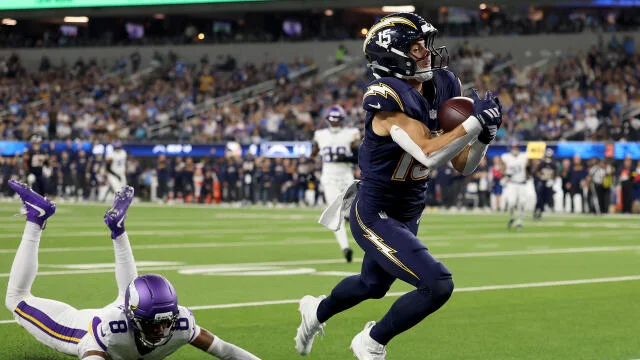The Los Angeles Chargers returned to form on Sunday, dispatching the Minnesota Vikings 37-10 in a commanding performance that left few doubts about the Chargers’ offensive firepower. Quarterback Justin Herbert was at the center of the action, throwing three touchdown passes and rushing for 62 yards, while the Chargers amassed 207 total rushing yards to overwhelm a Vikings defense already struggling through injuries.
Herbert’s performance included a touchdown pass to rookie wideout Oronde Gadsden II, another to second-year standout Ladd McConkey, and a third to fellow rookie Tre Harris. His ability to create with his legs as well as his arm highlighted his dual-threat capability, keeping Minnesota defenders off balance throughout the contest.
“It’s about making the most of opportunities,” Herbert said after the game. “When the guys around you are playing well and executing, it makes my job a lot easier.”
The Chargers, now 5-3 on the season, accomplished something they hadn’t done in nearly two years: they did not punt a single time. Their efficiency on offense allowed them to maintain control from the opening snap to the final whistle. Despite a brief scare early in the game—when Isaiah Rodgers appeared to intercept Herbert’s first pass and return it for a touchdown—replay overturned the call, and the Chargers quickly seized the momentum.
After the close call, Herbert connected on a 17-yard third-down conversion to veteran wide receiver Keenan Allen, keeping the drive alive. Eleven plays later, Gadsden II capped the march with a touchdown reception, setting the tone for the night. On the very next drive, running back Kimani Vidal powered in from three yards out, giving Los Angeles a 14-0 advantage just over 17 minutes into the contest.
The Vikings managed only a brief spark midway through the third quarter. Trailing 24-3, a tipped pass by Jalen Redmond resulted in an interception by Josh Metellus. Minnesota capitalized on two consecutive Chargers penalties on fourth down, converting with a four-yard touchdown pass from Carson Wentz to Jordan Addison. For a moment, it seemed like Minnesota might gain traction, but Los Angeles quickly quashed any hope. Vidal carried the ball on a 12-play, 82-yard drive that culminated in Harris’ first NFL touchdown. Soon after, Wentz threw another interception, effectively sealing the outcome.
Vidal’s performance was a standout in the Chargers’ backfield. The 5-foot-8, 215-pound running back totaled 117 rushing yards and a touchdown, his second 100-yard game in just three weeks. A former practice squad player, Vidal has emerged as a reliable weapon in the wake of injuries to Najee Harris and Omarion Hampton. His physical style of running consistently wore down the Vikings defense, and 93 of his 117 yards came in the second half.
“He just makes plays,” Herbert said. “When you lose a couple of great backs, having someone like Kimani step up is huge for the team.”
The Vikings, on the other hand, looked battered and overmatched in both offensive and defensive phases. Wentz, starting in place of the injured J.J. McCarthy, clearly played through pain, wearing a large brace on his left shoulder. He was sacked five times and hit repeatedly, finishing 15-for-27 for 144 yards. Minnesota’s running game managed only 34 yards compared to the Chargers’ dominant 207.
Injuries compounded Minnesota’s struggles. Left tackle Christian Darrisaw, tight end Josh Oliver, and cornerback Jeff Okudah all left the game or were ruled out due to injury. The team was already missing multiple key players, including tackle Brian O’Neill, linebacker Andrew Van Ginkel, and center Ryan Kelly. The patchwork offensive line was unable to generate push in the run game, and Wentz’s extended time holding the ball only magnified the pressure from the Chargers’ defensive front.
Defensively, the Vikings have been vulnerable all season. They rank 24th in rushing yards allowed per game and 25th in passing yards per attempt allowed. Against the Chargers, their deficiencies were fully exposed, echoing last week’s performance against Jalen Hurts, who posted a perfect passer rating. Head coach Brian Flores now faces pressing questions about how to shore up both sides of the ball as Minnesota enters a crucial stretch of the season.
Herbert’s performance also emphasized the chemistry he continues to build with his receivers, particularly Keenan Allen. The Chargers converted nine of 13 third-down attempts, many of them directly attributable to Herbert’s poise and decision-making under pressure. Allen, while not having a statistically huge game, secured three critical first-down catches on third down.
Los Angeles now turns its attention to Week 9, when they travel to face the Tennessee Titans. The Chargers are favored to extend their winning streak to two games, though they will monitor injury concerns, including standout safety Derwin James, who left Sunday’s contest with an ankle issue.
For the Vikings, avoiding a three-game losing streak will be challenging as they visit the 5-2 Detroit Lions. If Minnesota hopes to remain competitive in the NFC North, significant adjustments on both sides of the ball will be necessary. The team’s depth has been tested, and the lingering injuries have compounded the challenge, leaving coach Flores and his staff with plenty to address during the upcoming bye week.
Sunday’s contest also served as a reminder of Herbert’s overall skill set and the Chargers’ resilience in the face of adversity. From pinpoint passing to explosive runs, Herbert demonstrated why he remains among the NFL’s elite quarterbacks. Meanwhile, the emergence of Vidal adds a crucial piece to the offensive puzzle, especially in a season marked by injuries in the backfield.
While Minnesota will seek answers in the coming weeks, the Chargers appear poised to make a push for the postseason, blending veteran leadership with young talent and a quarterback capable of carrying the team through high-pressure situations.
In the end, Los Angeles’ performance Sunday was dominant, methodical, and emphatic—a statement win that reinforced their identity as one of the league’s most dangerous teams on both the ground and through the air. Minnesota, conversely, faces a series of urgent questions that will define their season if left unresolved.

